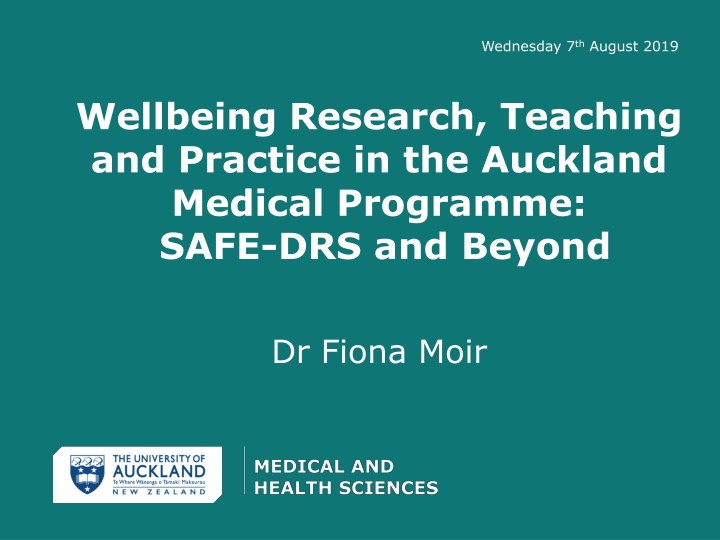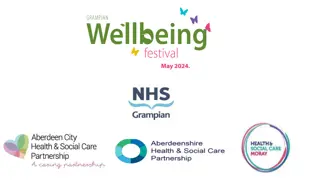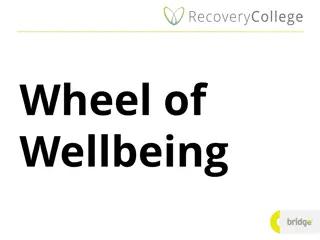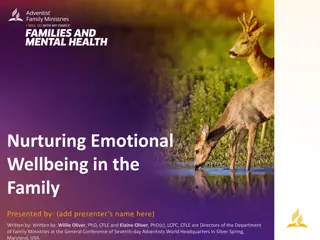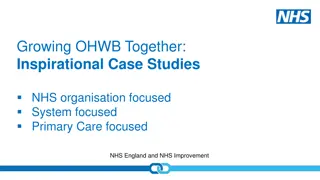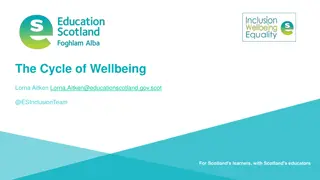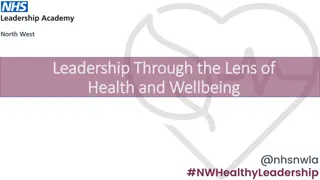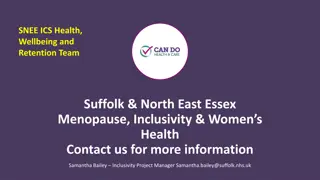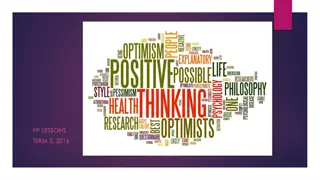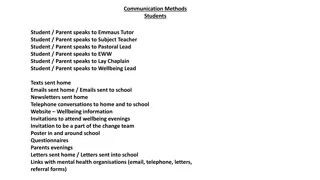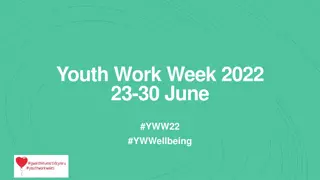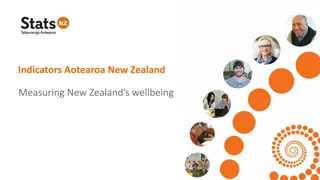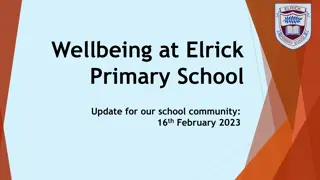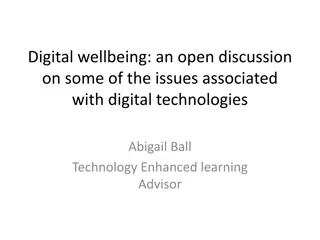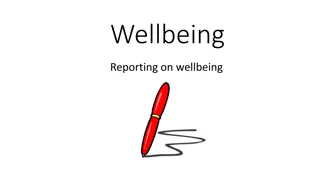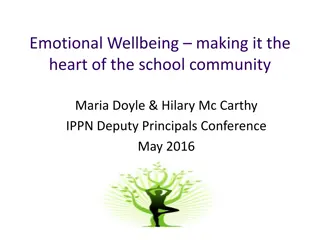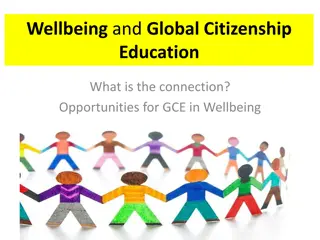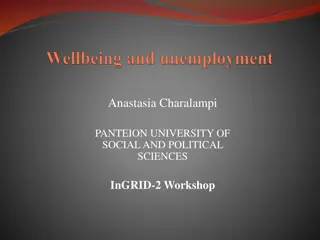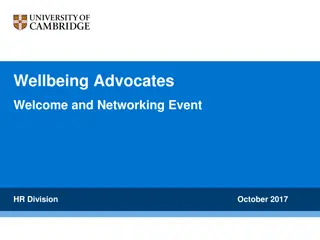Exploring Wellbeing Research and Initiatives in Medical Education
This presentation delves into various aspects of wellbeing research, teaching, and practice within the Auckland Medical Programme. Topics covered include the SAFE-DRS framework, systematic reviews on health benefits, prevalence studies comparing demographics and health data, intervention studies for mental health improvement, and summaries on cultivating healthy lifestyles in medical education.
Download Presentation

Please find below an Image/Link to download the presentation.
The content on the website is provided AS IS for your information and personal use only. It may not be sold, licensed, or shared on other websites without obtaining consent from the author.If you encounter any issues during the download, it is possible that the publisher has removed the file from their server.
You are allowed to download the files provided on this website for personal or commercial use, subject to the condition that they are used lawfully. All files are the property of their respective owners.
The content on the website is provided AS IS for your information and personal use only. It may not be sold, licensed, or shared on other websites without obtaining consent from the author.
E N D
Presentation Transcript
Wednesday 7th August 2019 Wellbeing Research, Teaching and Practice in the Auckland Medical Programme: SAFE-DRS and Beyond Dr Fiona Moir
This session Summary of Wellbeing Research SAFE-DRS Wellbeing Curriculum Pastoral Care Structure and Initiatives 2
Systematic reviews A systematic review of the health benefits of Tai Chi for students in higher education. Preventive Medicine Reports, Integrating mindfulness and physical exercises for medical students: A systematic review. OBM Integrative and Complementary Medicine, Workplace harassment among staff in higher education: A systematic review. Asia Pacific Education Review 4
Prevalence studies: comparators and associations Currently working on SAFE-DRS : Final year medical students: demographics and data on physical health, mental health, alcohol use, help- seeking behaviour, personal health behaviour (e.g. exercise, smoking, nutrition) Report prevalence Comparison with general population Comparison with international sample (Canada) Correlations: demographics & questionnaire scores, personal health behaviour & questionnaire scores, patient interactions & questionnaire scores etc 5
Intervention studies & cohort designs Pre/post, controlled trial, RCT A peer-support and mindfulness program to improve the mental health of medical students. Teaching and Learning in Medicine The mental health of medical students and their use of a self-help website. New Zealand Medical Journal. Prospective cohort design, also ; 6
Summaries and comprehensive reviews (Books and Book Chapters) Wellbeing in higher education: Cultivating a healthy lifestyle among faculty and students Preventing burnout in undergraduate and postgraduate students studying medicine. In T. N. Winston (Ed.), Handbook on burnout and sleep deprivation: Risk factors, management strategies and impact on performance and behavior The quality of life of medical students and clinicians. In A. P. Giardino, & E. R. Giardino (Eds.), Medical education: Global perspectives, challenges and future directions 7
Conceptual models, initiatives, perspectives and reviews A conceptual model of workplace stress: The issue of accumulation and recovery and the health professional. New Zealand Journal of Employment Relations Depression in medical students: current insights Advances in medical education and practice SAFE-DRS: Health and wellbeing in the curriculum in the Auckland Medical Programme. 8
SAFE-DRS WHY WE DEVELOPED IT WHERE IN CURRIULUM WHAT WE INCLUDED HOW WE TEACH AND ASSESS IT FEEDBACK 10
WORKSHOP OUTLINE INTRODUCTION DESIGNING THE CURRICULUM: AIMS TOPICS LEARNING OUTCOMES ASSESSMENT 11
The Evidence with studies indicating that these (mindfulness and relaxation) reduce anxiety, psychological distress and depression (Shapiro et al., 2000; Hassked et al., 2009; Warnecke et al., 2011) At the same time they facilitate the development of positive affect and immune functioning (Davidson et al., 2003), empathy and compassion, self-awareness, self-regulation and improved clinical decision-making (Epstein, 1999; Shapiro, 2000; Hassed et al., 2009). 12
Arguments for a HWB curriculum Doctors Self-care Patient Care Doctors Health Medical Error Professionalism Societal Expectations Retention, Burnout, Morale, Job Withdrawal patients Mental Health of Students Evidence for Mindfulness medical profession wider environment 13 24/09/2024
Auckland Medical Programme Longitudinal Domains Applied Science for Medicine Clinical and Communication Skills Hauora Maori Population Health Professional & Personal Skills (5th Domain added) Professionalism and Reflective Practice Ethics and The Law Health and Well-being (SAFE-DRS) Cultural Competence Learning and Teaching Clinical Leadership 14
AIMS:WHAT WOULD THIS PART OF A CURRICULUM BE AIMING TO ACHIEVE? (WRITE 2 OR 3 AIMS FROM THE PERSPECTIVE OF THE PROGRAMME) LEARNING OUTCOMES: BY THE END OF THIS COURSE, THE STUDENT WILL BE ABLE TO ) 15
SAFE-DRS COMPONENTS Self Care Skills Access Help Focused Attention Emotional Intelligence Dr as Patient and Colleague Reflective Practice Stress Resistance 17
Variety and Flexibility Evidence-based and fun (quiz, prizes, creative) Model (a doctor and a person) Teach other technique alongside mindfulness Small group debrief (clinical experiences) Relevant HWB stories from doctors Give some options (choice) 18
Spiral (Re-visit/Re-inforce Topics): E.g. Emotional Intelligence Year 2: Definition, Components, Relevance for Students Year 4: Patient Interactions, Professionalism, Relevance for doctors Year 5: Leadership, Team Work module links to videos and sites, how to improve EI)
Summative and Formative Required attendance and participation Written tutor feedback Direct observation on wards Written exam questions Progress Tests Essays Portfolios 20
Initially.. What Some Students Thought .. Stop forcing me to think about myself .What Some Staff Thought Why on earth are you filling up valuable space in the curriculum with something like mindfulness , just because it s fashionable? 21
Unfortunately it also seems in fashion to .. Make mistakes Bully junior doctors Commit suicide Wish you had a different job Leave medicine
Year 2 student evaluation (2013) n=237 # = 1 missing value Strongly Disagree Disagree Slightly Slightly Agree Agree Strongly Agree Disagree The HWB lectures/SGA have changed my self-awareness and/or behaviour regarding my personal health Writing the HEP diary has changed my self-awareness regarding my personal health # Writing the HEP diary has changed my behaviour regarding my personal health # Practising techniques such as mindfulness in the SGA has been beneficial # 0 4 9 69 89 66 6 12 30.5 79.5 75 33 8 17 30 93.5 61.5 26 3 11 13 84 75 50
The HWB lectures/Small Group Activities have changed my self- awareness and/or behaviour regarding my personal health 65% agree or strongly agree, 95% any agree Writing the Health Enhancement Diary has changed my behaviour regarding my personal health 37% agree or strongly agree, 77% any agree
Practical Suggestions Separate wellbeing curriculum, wellbeing initiatives and wellbeing support structures HWB committee (status), clear TOR Learn/refer to the evidence (some at your fingertips) STAFF and STUDENTS Tie into other topics (get other staff involved) Develop pastoral care pathways and policies
Contact your clinical coordinator Circumstances which prevent you from meeting an assignment deadline Apply for special conditions if appropriate. Sit exam/test if at all possible. Apply for aegrotat or compassionate consideration within 7 days of last exam www.auckland.ac.nz/uoa/cs-examination-information (www.auckland.ac.nz/uoa/cs-examination-information) Contact Student Health & Counselling, - ring (09) 923 7681 or see Kate Snow if unsure. UOA Student Counselling Appointments/Emergencies - Ring (09) 923 7681 For full details visit: www.auckland.ac.nz/counselling. Illness or misfortune which impairs your ability to perform in an examination or test Contact Kate Snow if you need assistance in gaining an appointment. Personal Wellbeing Seek support: Faculty staff are available for confidential discussions e.g. Tim Cundy, Kira Bacal or Kate Snow Anxious, stressed, overwhelmed, depressed, or personal issues . Need Help? Support for impairments: Contact Disability Services (disabilities@auckland.ac.nz) Electronic resources: www.calm.auckland.ac.nz CALM - www.calm.auckland.ac.nz www.thelowdown.co.nz www.thelowdown.co.nz www.ulifeline.org www.ulifeline.org Lifeline (24/7) ring 0800 543354 Talk to your friends Having an issue with a teacher? E.g. sexist or discriminatory comments Document your concern in writing including time and date and contact Matt Dawes (YR 4) or either Kira Bacal or Tim Cundy For informal and confidential help contact the Proctor. For more information www.auckland.ac.nz/proctor www.auckland.ac.nz/proctor Having issues with a student?
www.calm@auckland.ac.nz The Desk: https://www.thedesk.org.au Ulifeline: http://www.ulifeline.org www.freemindfulness.org https://www.headspace.com www.bigwhitewall.com
This session Summary of Wellbeing Research SAFE-DRS Wellbeing Curriculum Pastoral Care Structure and Initiatives 29
Let it go, Let it out, Let it all unravel, Let it free, and it can be A road on which to travel. SELF-AWARENESS;SELF-REFLECTION;SELF-DEVELOPMENT Thank you Please contact Fiona Moir f.moir@auckland.ac.nz
